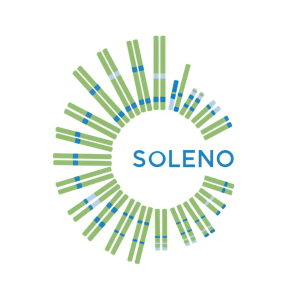Soleno Therapeutics Announces Collaboration with Vanderbilt University to Discover and Develop Next Generation K(ATP) Channel Activators for the Treatment of Rare Diseases
Soleno Therapeutics (NASDAQ: SLNO) announced a collaboration with Vanderbilt University to develop novel KATP channel activators aimed at treating rare diseases. The collaboration will be led by Dr. Craig Lindsley and Dr. Jerod Denton, who will leverage their expertise to develop potential new therapeutics. Soleno's lead candidate, DCCR, has shown promise in Phase 3 trials for Prader-Willi syndrome. The partnership aims to create robust tools for identifying these activators, with expectations to advance successful candidates into clinical trials.
- Collaboration with Vanderbilt University enhances research capabilities.
- Successful Phase 3 study of DCCR indicates strong therapeutic potential.
- Opportunity to develop new KATP channel activators could diversify product pipeline.
- None.
REDWOOD CITY, Calif., Feb. 23, 2021 (GLOBE NEWSWIRE) -- Soleno Therapeutics, Inc. (“Soleno”) (NASDAQ: SLNO), a clinical-stage biopharmaceutical company developing novel therapeutics for the treatment of rare diseases, today announced that it has signed a collaboration agreement with Vanderbilt University. This collaboration aims to discover and develop novel KATP channel activators with the potential to treat rare diseases. The collaboration will be led by Drs. Craig Lindsley and Jerod Denton. Dr. Lindsley is currently the William K. Warren, Jr. Chair in Medicine, Professor of Pharmacology, Chemistry and Biochemistry, the Director of the Warren Center for Neuroscience Drug Discovery and Editor-in-Chief of the Journal of Medicinal Chemistry. Dr. Denton is a Professor in the Departments of Anesthesiology and Pharmacology and the Director of Ion Channel Pharmacology at the Warren Center for Neuroscience Drug Discovery. Terms of the collaboration were not disclosed.
ATP-dependent potassium (or KATP) channels are present in several tissues in the body. Activating these channels has been shown to be beneficial in the treatment of various rare diseases, such as hyperinsulinemic hypoglycemia. Soleno’s product candidate, DCCR, is a potent activator of KATP channels and has demonstrated significant benefits in a Phase 3 study for the treatment of Prader-Willi syndrome (PWS).
“The insight we already have serves as an effective foundation to identify, characterize and develop novel KATP channel activators that may be more potent, specific and/or safer than currently approved therapeutics,” said Dr. Lindsley. “Based on the role KATP channels play in controlling and regulating cellular functions, we believe therapeutics targeting this channel could have potential in treating multiple rare diseases. We look forward to working closely with Soleno, whose ongoing development of DCCR for PWS has yielded encouraging clinical results to date, to further our research in this important and widely applicable area.”
“Having discovered the only new KATP channel activator chemistries in the last 20 years, the highly experienced team of Drs. Lindsley and Denton are ideally suited to work with us to identify and characterize novel drug candidates that could serve as the underpinnings for our next generation of products,” said Anish Bhatnagar, M.D., Chief Executive Officer of Soleno Therapeutics. “We believe that combining their expertise with our experience around the therapeutic potential of KATP channel activators based on our Phase 3 program of DCCR in PWS will be an effective and efficient path to new therapeutic products.”
The initial aims of this collaboration are to develop robust in vivo and in vitro tools to identify and characterize novel KATP channel activators from recently identified new classes of chemistry. Soleno expects to advance appropriate candidates generated from this collaboration into the clinic in the future.
About Soleno Therapeutics, Inc.
Soleno is focused on the development and commercialization of novel therapeutics for the treatment of rare diseases. The company’s lead candidate DCCR (diazoxide choline tablets, a once-daily oral tablet for the treatment of Prader-Willi Syndrome (PWS), is currently being evaluated in a Phase 3 clinical development program. Diazoxide choline has received Orphan Drug Designation for the treatment of PWS in the U.S. and EU, and Fast Track Designation in the U.S. For more information, please visit www.soleno.life.
Forward-Looking Statements
This press release contains forward-looking statements within the meaning of Section 21E of the Securities Exchange Act of 1934, as amended. All statements other than statements of historical facts contained in this press release are forward-looking statements, including statements regarding the potential of KATP channel activators for the treatment of hyperphagic obesity syndromes. In some cases, you can identify forward-looking statements by terms such as "may," "will," "should," "expect," "plan," "anticipate," "could," "intend," "target," "project," "contemplates," "believes," "estimates," "predicts," "potential" or "continue" or the negative of these terms or other similar expressions. These forward-looking statements speak only as of the date of this press release and are subject to a number of risks, uncertainties and assumptions, including the risks and uncertainties associated with market conditions, as well as risks and uncertainties inherent in Soleno’s business, including those described in the company's prior press releases and in the periodic reports it files with the SEC. The events and circumstances reflected in the company's forward-looking statements may not be achieved or occur and actual results could differ materially from those projected in the forward-looking statements. Except as required by applicable law, the company does not plan to publicly update or revise any forward-looking statements contained herein, whether as a result of any new information, future events, changed circumstances or otherwise.
Corporate Contact:
Brian Ritchie
LifeSci Advisors, LLC
212-915-2578
FAQ
What is the collaboration between Soleno Therapeutics and Vanderbilt University about?
What is Soleno's lead candidate in its drug development?
What are K<sub>ATP</sub> channels and their significance in Soleno's research?
What insights were shared by Dr. Lindsley regarding the collaboration?







